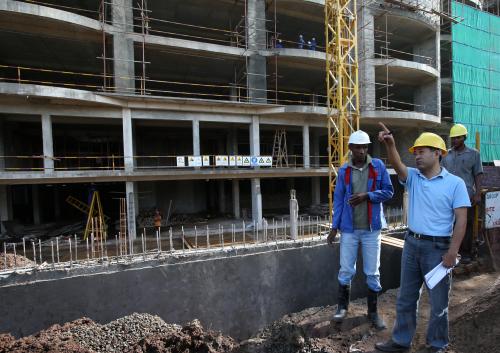|
 |
|
BUILDING TOGETHER: A Chinese project manager and local employees work at the construction site of a shopping mall in Moshi, Tanzania, on April 13, 2013 (XINHUA) |
For example, international media have reported massive Chinese agricultural investments and interests in several countries in Africa, including $800 million being invested in large-scale farming in Mozambique in the Zambezi Valley, with 20,000 Chinese workers sustaining these projects.
However, field research indicates that this is not the case.
Instead, many of the Chinese-operated farms in various African countries do not produce for large-scale export to China but for the local market.
In the case of Mozambique, field work did not find any proof of the above large investment and thousands of Chinese workers, but rather a Chinese training center operating on 30 hectares of land for hybrid rice farming. This is supported by studies by the Swedish International Agricultural Network Initiative (SIANI).
The reports give a sense that Sino-African cooperation in agriculture that goes back to the early 1960s mostly operates in the form of foreign development cooperation projects and not agricultural land investments, as claimed by many.
Chinese aid projects
During the last 60-plus years, more than 40 African countries have hosted Chinese agricultural aid projects and more than 90 farms have been developed through Chinese aid.
As of 2009, China had carried out about 200 agricultural projects, and another 20 in the fishing industry.
According to SIANI's studies, the Chinese Ministry of Commerce (MOFCOM) has reported that there are over 1,100 Chinese agricultural experts in Africa, maintaining at least 11 agricultural research stations.
However, contrary to widespread claims, Chinese "land grabs" are not happening in Africa on the scale suggested.
These findings are also supported by research by the Johns Hopkins School of Advanced International Studies.
Now that China has become a major global economic power and with a thirst for external resources to help its growth engine keep humming, "China-bashing" over farmland acquisition has found a receptive audience in many parts of the world.
By the time the World Bank study was released and Land Matrix revised its numbers, the wrong figures had been quoted and re-quoted so extensively that they had been accepted by many scholars and media as truth.
This has unfortunately created an environment of misinformation and mistrust toward foreign farmland investment, mostly by Chinese groups.
Land grabs and their potential implications for food security at local, regional and global levels, as well as economic development and poverty alleviation in the countries concerned, are important issues and need to be studied carefully. However, this is still not being done.
There is clear evidence that emerging economic powers like China and India are setting their own agendas in terms of access to natural resources beyond their own borders to ensure their continued economic growth in the future.
Nevertheless, the lack of reliable data, poor research and extensive use of unreliable information have contributed to the current confusion and misinformation surrounding land grabs and their implications for food security, economic development and poverty alleviation.
In the age of ready information, availability does not guarantee accuracy. Land grabs and food security are clear examples. Accusations and assumptions, mostly against and about China, are shaping global public opinion, even though they are often based on flimsy and erroneous data.
More worryingly, analyses are still not addressing fundamental issues such as what could be the most appropriate food security-related policies nationally, regionally and globally. Poor scholarship and extensive dissemination of untruths, by negatively shaping global public opinion, can only hamper truly effective initiatives to foster the development of impoverished regions. n
The author is senior research fellow at the Institute of Water Policy, Lee Kuan Yew School of Public Policy, National University of Singapore. She authored a case study for the Post-2015 UN MDG Development Agenda
(The article was originally published in Shanghai Daily, August 5)
Email us at: liuyunyun@bjreview.com | 